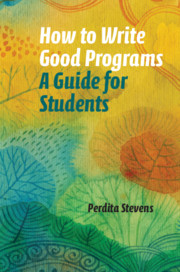Book contents
- Frontmatter
- Contents
- 1 Introduction
- 2 What Are Good Programs?
- 3 How to Get Started
- 4 How to Understand Your Language
- 5 How to Use the Best Tools
- 6 How to Make Sure You Don’t Lose Your Program
- 7 How to Test Your Program
- 8 How to Make Your Program Clear
- 9 How to Debug Your Program
- 10 How to Improve Your Program
- 11 How to Get Help (without Cheating)
- 12 How to Score Well in Coursework
- 13 How to Score Well in a Programming Exam
- 14 How to Choose a Programming Language
- 15 How to Go Beyond This Book
- Bibliography
- Index
11 - How to Get Help (without Cheating)
Published online by Cambridge University Press: 10 July 2020
- Frontmatter
- Contents
- 1 Introduction
- 2 What Are Good Programs?
- 3 How to Get Started
- 4 How to Understand Your Language
- 5 How to Use the Best Tools
- 6 How to Make Sure You Don’t Lose Your Program
- 7 How to Test Your Program
- 8 How to Make Your Program Clear
- 9 How to Debug Your Program
- 10 How to Improve Your Program
- 11 How to Get Help (without Cheating)
- 12 How to Score Well in Coursework
- 13 How to Score Well in a Programming Exam
- 14 How to Choose a Programming Language
- 15 How to Go Beyond This Book
- Bibliography
- Index
Summary
Most students, at some stage, need help. Perhaps you are stuck on some specific point, or perhaps you feel generally confused. This chapter helps you to sort out what your problem is, and make a plan to fix it. When, and how, should you approach someone else – on your course, or on the wider internet – for help?
- Type
- Chapter
- Information
- How to Write Good ProgramsA Guide for Students, pp. 156 - 169Publisher: Cambridge University PressPrint publication year: 2020

